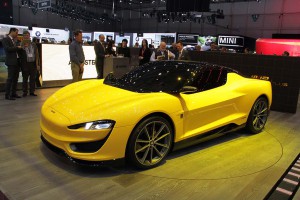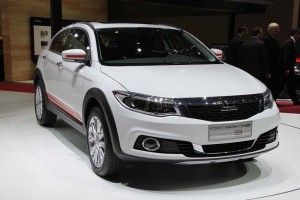
The Geneva Motor Show brings out all types of new models and makers, including Magna and its Mila concept, but noticeably absent: Apple and Google.
With names like Qoros and Apollo Vredestein and Rinspeed, the Geneva Motor Show brings out a mix of manufacturers and suppliers seldom seen at any other event of its kind. But two names, while absent, made their presence felt especially keenly this year.
Apple and Google were those unseen participants, traditional automakers openly wondering whether they might soon step in with the sort of advanced technologies – and deep pockets that could radically reshape the established automotive order.
Both companies are “incredibly serious” about entering the automotive business, said Sergio Marchionne, the CEO of Fiat Chrysler, during a media roundtable at the Geneva show. Both of the technology giants have been pushing to play a role in future infotainment systems, and a number of manufacturers have begun adding Apple’s Car Play system to their vehicles, as well as a similar system using Google’s Android operating system.
But their ambitions apparently aren’t limited to the top of the instrument panel or buttons on the steering wheel. When asked if Apple and Google are likely to get into the business of building cars, in some form another, Marchionne replied, “they will,” quickly adding his belief that “exactly what this industry needs, a disruptive interloper” that can shake up the established status quo.

Automakers around the world, like China's Qoros, flock to the Geneva Motor Show to show off their products.
In what form the two companies will expand their presence in the auto industry is unclear. Google has been working openly on developing autonomous driving technology. It recently turned to Detroit automotive supplier Rousch to turn out a test fleet of about 100 so-called “Google Cars,” bubble-shaped prototypes that it plans to fleet test near its Silicon Valley headquarters.
Despite launching its own fleet test, Chris Urmson, the head of the Google autonomous vehicle program, says his company doesn’t want to get into manufacturing, and will seek out potential partners.
Apple has been far less forthcoming about its plans – in keeping with its traditionally secretive nature – though as it moves ahead, details have begun to leak out. It has been snatching up key talent from established automakers, and is said to be working on an autonomous, battery-powered vehicle under the codename “Project Titan.”
So far, no one has seen an Apple Car, but industry observers are betting it’s only a matter of time. It remains unclear whether the iPhone company wants to build vehicles on its own. It reportedly has been in private conversation with several upscale manufacturers about a partnership. But it might also choose to go it alone, some analysts believe.
Getting into the car business isn’t cheap, especially if a company has high-volume aspirations in line with the mass market consumer electronics industry. It can cost $1 billion or more to develop a new vehicle from scratch – using traditional technologies, and coming up with all-new electric powertrain and autonomous driving systems could rapidly multiple that price. An assembly plant could add another billion to the price tag.
(Fiat Chrysler could seek new alliances, hints Marchionne, possibly Apple. For more, Click Here.)
Apple certainly has the resources, with $178 billion in cash and a market value of around $750 billion – more than the capitalization of almost the entire Top 10 traditional automotive manufacturers.
And that’s what worries many potential competitors. During his Geneva news conference, Marchionne readily admitted being “concerned about a well-funded interloper.”
(Click Here for details about Carlos Ghosn and Apple’s possible car-building efforts.)
The FCA Automobiles chief isn’t the only one looking over his shoulder to see whether Apple and Google are entering the race. At a time when the auto industry is going through some of the most rapid changes in more than a century, “It is refreshing to see even tech companies joining in,” said Carlos Ghosn, CEO of the Renault-Nissan Alliance, during his own media roundtable.
“I absolutely am not fearful or hostile,” he said, adding that, “I think everyone who joins is an ally” who could make autonomous driving a reality. The Euro-Japanese maker has its own self-driving technology in development, with semi-autonomous models set to begin rolling out in 2017, and a fully autonomous car due to market early in the next decade.
(To see more about VW being the auto industry’s tech leader, Click Here.)
“We are also very interested” in what Google and Apple have in the works, declared Martin Winterkorn, CEO of Volkswagen AG, the world’s second-largest automotive manufacturer. During its own Geneva media event, the German maker revealed it invested €11.5 billion, or nearly $13 billion in its “Future Tracks” R&D program last year, with a goal of being the industry’s “innovation think tank,” according to Winterkorn.
Much of that went to VW’s own battery power and autonomous vehicle research programs. Whether it will view Apple and Google as potential adversaries or partners remains to be seen. That seems to be the same unanswered question facing the rest of the established auto industry.
